A Research Proposal: Analyzing Childhood Obesity (4-10) in the UK
VerifiedAdded on 2023/06/15
|6
|2003
|362
Report
AI Summary
This research proposal investigates childhood obesity in the UK among children aged 4-10. The research aims to understand the impact of childhood obesity, analyze its causes and risk factors, determine the challenges faced, and examine strategies to minimize its impact. The proposal outlines a mixed-methods approach to data collection, including literature reviews and potential surveys, focusing on participants from urban areas with specific age and eating habits. The rationale emphasizes personal and professional development, with data analysis involving restructuring accumulated data for information sharing. The study also addresses ethical considerations and data management plans, including data collection, processing, analysis, archiving, and access, with the goal of producing impactful research outputs and publications. Desklib offers a platform to explore this and similar research documents for students.
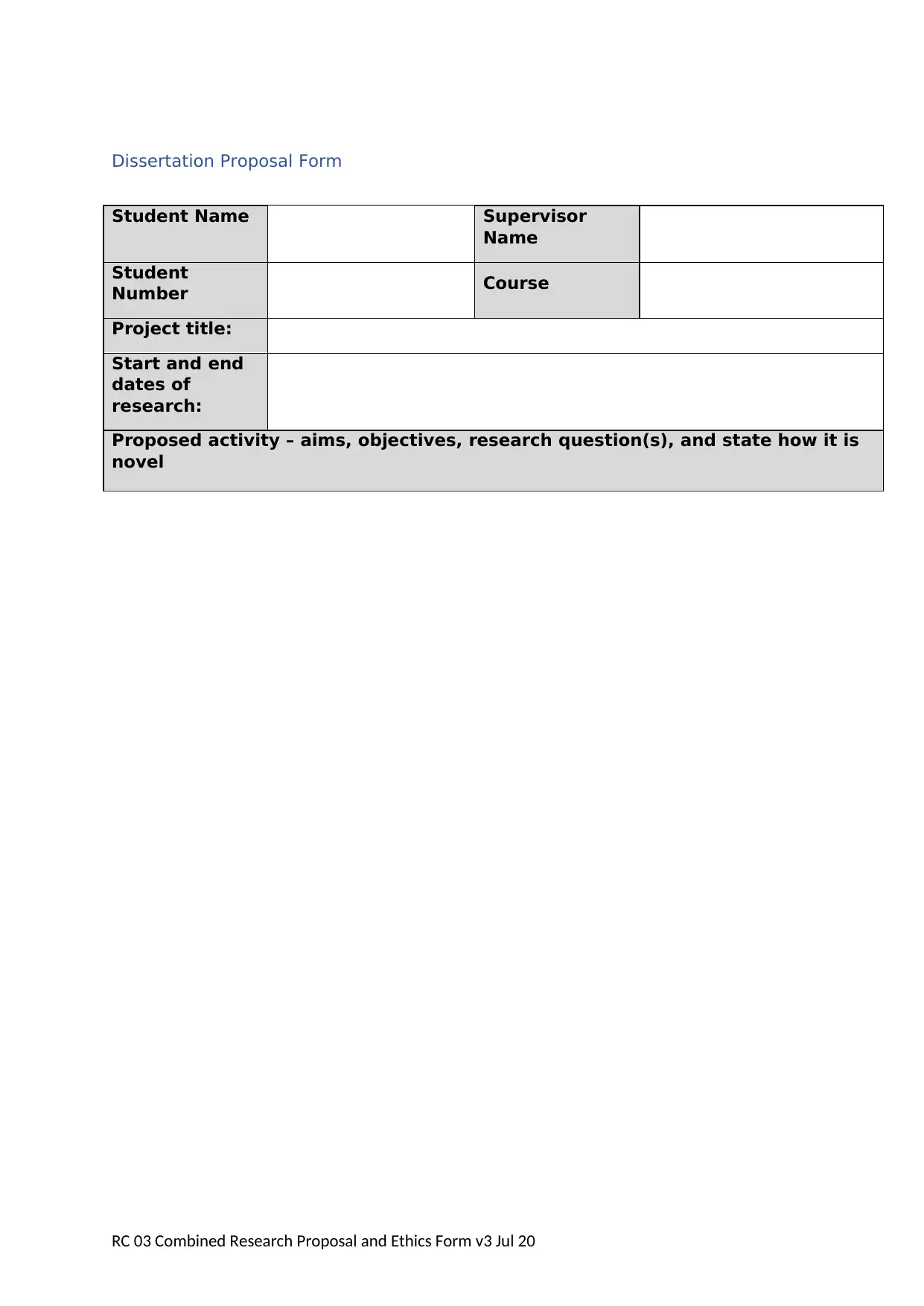
Dissertation Proposal Form
Student Name Supervisor
Name
Student
Number Course
Project title:
Start and end
dates of
research:
Proposed activity – aims, objectives, research question(s), and state how it is
novel
RC 03 Combined Research Proposal and Ethics Form v3 Jul 20
Student Name Supervisor
Name
Student
Number Course
Project title:
Start and end
dates of
research:
Proposed activity – aims, objectives, research question(s), and state how it is
novel
RC 03 Combined Research Proposal and Ethics Form v3 Jul 20
Paraphrase This Document
Need a fresh take? Get an instant paraphrase of this document with our AI Paraphraser
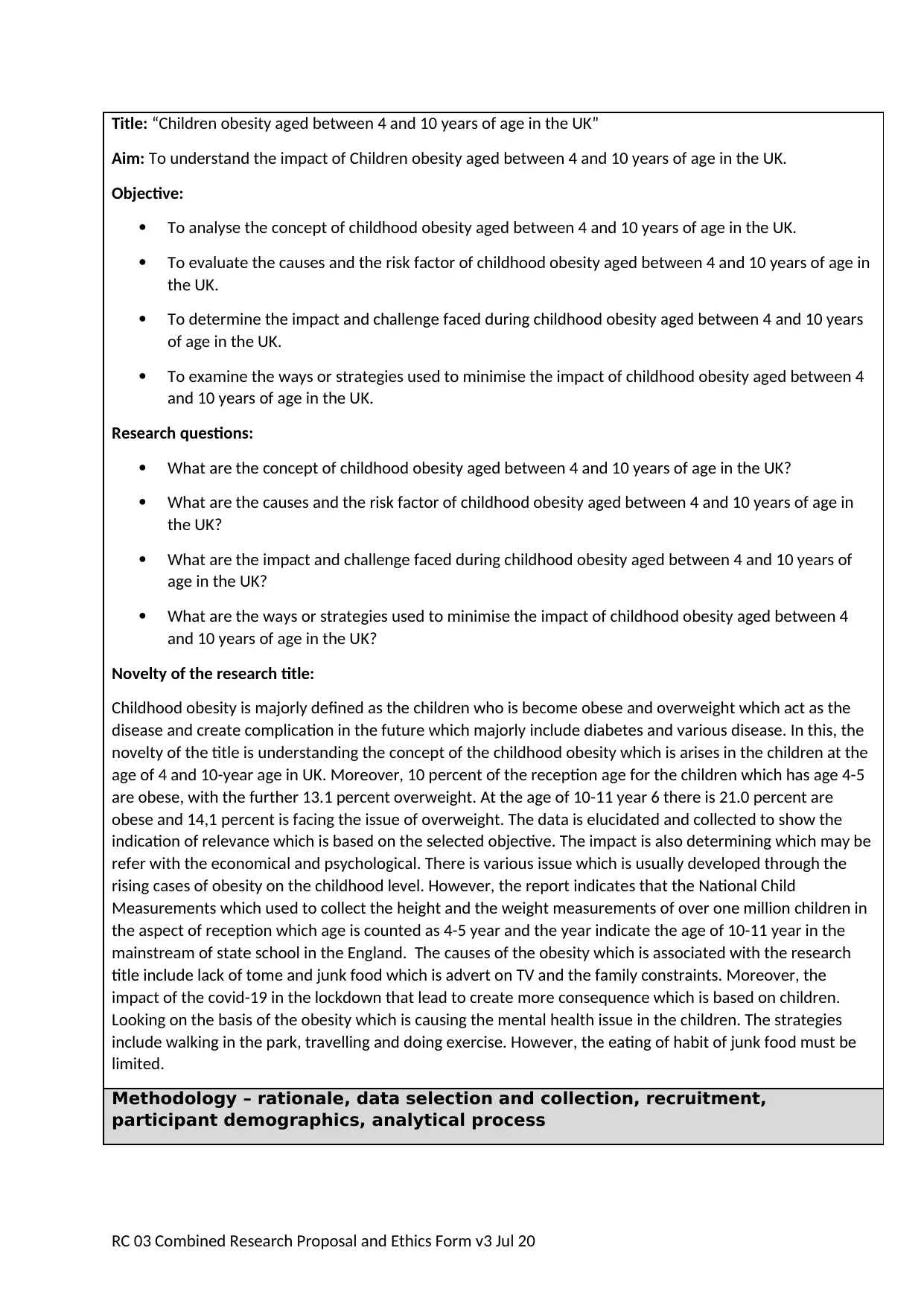
Title: “Children obesity aged between 4 and 10 years of age in the UK”
Aim: To understand the impact of Children obesity aged between 4 and 10 years of age in the UK.
Objective:
To analyse the concept of childhood obesity aged between 4 and 10 years of age in the UK.
To evaluate the causes and the risk factor of childhood obesity aged between 4 and 10 years of age in
the UK.
To determine the impact and challenge faced during childhood obesity aged between 4 and 10 years
of age in the UK.
To examine the ways or strategies used to minimise the impact of childhood obesity aged between 4
and 10 years of age in the UK.
Research questions:
What are the concept of childhood obesity aged between 4 and 10 years of age in the UK?
What are the causes and the risk factor of childhood obesity aged between 4 and 10 years of age in
the UK?
What are the impact and challenge faced during childhood obesity aged between 4 and 10 years of
age in the UK?
What are the ways or strategies used to minimise the impact of childhood obesity aged between 4
and 10 years of age in the UK?
Novelty of the research title:
Childhood obesity is majorly defined as the children who is become obese and overweight which act as the
disease and create complication in the future which majorly include diabetes and various disease. In this, the
novelty of the title is understanding the concept of the childhood obesity which is arises in the children at the
age of 4 and 10-year age in UK. Moreover, 10 percent of the reception age for the children which has age 4-5
are obese, with the further 13.1 percent overweight. At the age of 10-11 year 6 there is 21.0 percent are
obese and 14,1 percent is facing the issue of overweight. The data is elucidated and collected to show the
indication of relevance which is based on the selected objective. The impact is also determining which may be
refer with the economical and psychological. There is various issue which is usually developed through the
rising cases of obesity on the childhood level. However, the report indicates that the National Child
Measurements which used to collect the height and the weight measurements of over one million children in
the aspect of reception which age is counted as 4-5 year and the year indicate the age of 10-11 year in the
mainstream of state school in the England. The causes of the obesity which is associated with the research
title include lack of tome and junk food which is advert on TV and the family constraints. Moreover, the
impact of the covid-19 in the lockdown that lead to create more consequence which is based on children.
Looking on the basis of the obesity which is causing the mental health issue in the children. The strategies
include walking in the park, travelling and doing exercise. However, the eating of habit of junk food must be
limited.
Methodology – rationale, data selection and collection, recruitment,
participant demographics, analytical process
RC 03 Combined Research Proposal and Ethics Form v3 Jul 20
Aim: To understand the impact of Children obesity aged between 4 and 10 years of age in the UK.
Objective:
To analyse the concept of childhood obesity aged between 4 and 10 years of age in the UK.
To evaluate the causes and the risk factor of childhood obesity aged between 4 and 10 years of age in
the UK.
To determine the impact and challenge faced during childhood obesity aged between 4 and 10 years
of age in the UK.
To examine the ways or strategies used to minimise the impact of childhood obesity aged between 4
and 10 years of age in the UK.
Research questions:
What are the concept of childhood obesity aged between 4 and 10 years of age in the UK?
What are the causes and the risk factor of childhood obesity aged between 4 and 10 years of age in
the UK?
What are the impact and challenge faced during childhood obesity aged between 4 and 10 years of
age in the UK?
What are the ways or strategies used to minimise the impact of childhood obesity aged between 4
and 10 years of age in the UK?
Novelty of the research title:
Childhood obesity is majorly defined as the children who is become obese and overweight which act as the
disease and create complication in the future which majorly include diabetes and various disease. In this, the
novelty of the title is understanding the concept of the childhood obesity which is arises in the children at the
age of 4 and 10-year age in UK. Moreover, 10 percent of the reception age for the children which has age 4-5
are obese, with the further 13.1 percent overweight. At the age of 10-11 year 6 there is 21.0 percent are
obese and 14,1 percent is facing the issue of overweight. The data is elucidated and collected to show the
indication of relevance which is based on the selected objective. The impact is also determining which may be
refer with the economical and psychological. There is various issue which is usually developed through the
rising cases of obesity on the childhood level. However, the report indicates that the National Child
Measurements which used to collect the height and the weight measurements of over one million children in
the aspect of reception which age is counted as 4-5 year and the year indicate the age of 10-11 year in the
mainstream of state school in the England. The causes of the obesity which is associated with the research
title include lack of tome and junk food which is advert on TV and the family constraints. Moreover, the
impact of the covid-19 in the lockdown that lead to create more consequence which is based on children.
Looking on the basis of the obesity which is causing the mental health issue in the children. The strategies
include walking in the park, travelling and doing exercise. However, the eating of habit of junk food must be
limited.
Methodology – rationale, data selection and collection, recruitment,
participant demographics, analytical process
RC 03 Combined Research Proposal and Ethics Form v3 Jul 20
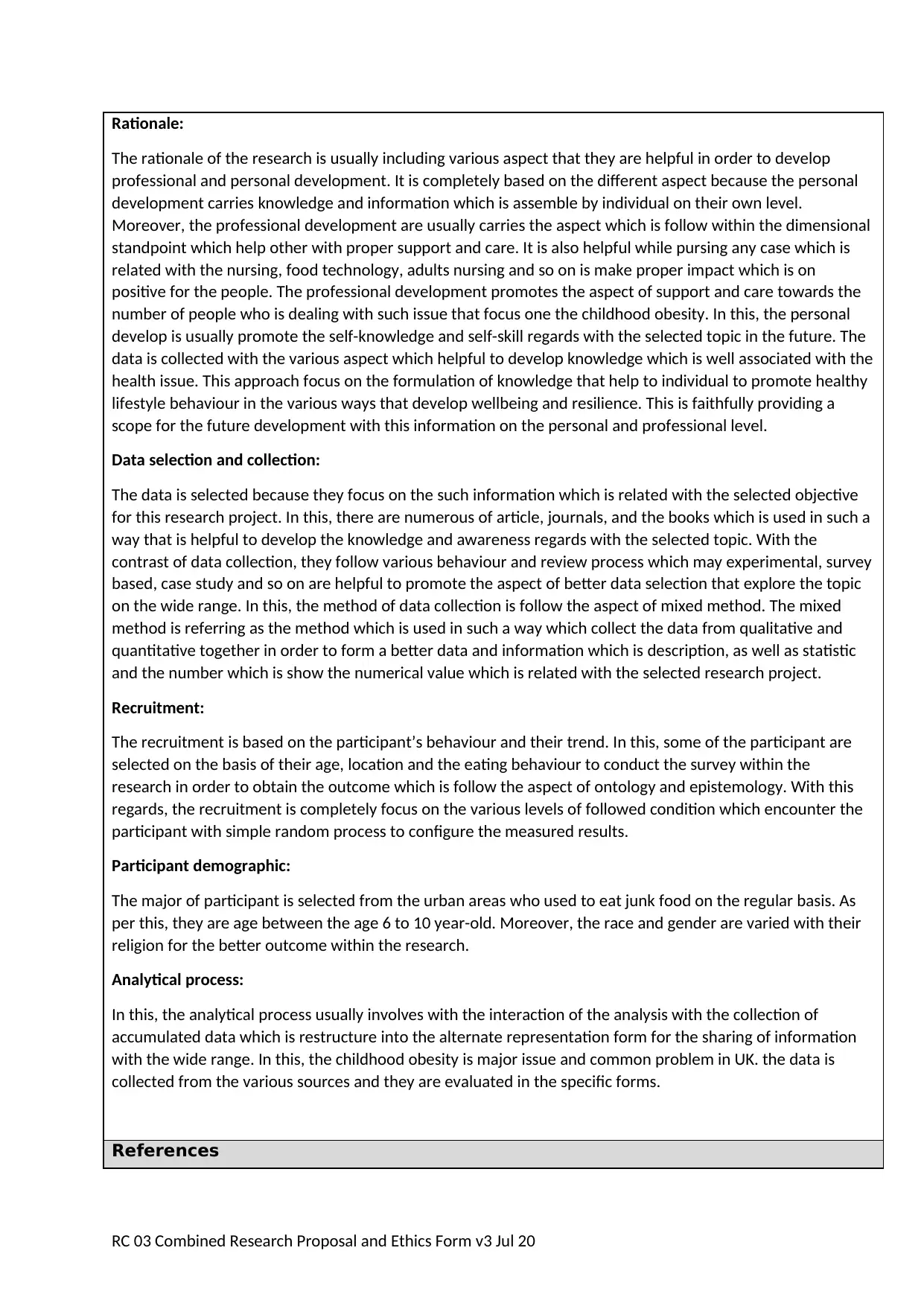
Rationale:
The rationale of the research is usually including various aspect that they are helpful in order to develop
professional and personal development. It is completely based on the different aspect because the personal
development carries knowledge and information which is assemble by individual on their own level.
Moreover, the professional development are usually carries the aspect which is follow within the dimensional
standpoint which help other with proper support and care. It is also helpful while pursing any case which is
related with the nursing, food technology, adults nursing and so on is make proper impact which is on
positive for the people. The professional development promotes the aspect of support and care towards the
number of people who is dealing with such issue that focus one the childhood obesity. In this, the personal
develop is usually promote the self-knowledge and self-skill regards with the selected topic in the future. The
data is collected with the various aspect which helpful to develop knowledge which is well associated with the
health issue. This approach focus on the formulation of knowledge that help to individual to promote healthy
lifestyle behaviour in the various ways that develop wellbeing and resilience. This is faithfully providing a
scope for the future development with this information on the personal and professional level.
Data selection and collection:
The data is selected because they focus on the such information which is related with the selected objective
for this research project. In this, there are numerous of article, journals, and the books which is used in such a
way that is helpful to develop the knowledge and awareness regards with the selected topic. With the
contrast of data collection, they follow various behaviour and review process which may experimental, survey
based, case study and so on are helpful to promote the aspect of better data selection that explore the topic
on the wide range. In this, the method of data collection is follow the aspect of mixed method. The mixed
method is referring as the method which is used in such a way which collect the data from qualitative and
quantitative together in order to form a better data and information which is description, as well as statistic
and the number which is show the numerical value which is related with the selected research project.
Recruitment:
The recruitment is based on the participant’s behaviour and their trend. In this, some of the participant are
selected on the basis of their age, location and the eating behaviour to conduct the survey within the
research in order to obtain the outcome which is follow the aspect of ontology and epistemology. With this
regards, the recruitment is completely focus on the various levels of followed condition which encounter the
participant with simple random process to configure the measured results.
Participant demographic:
The major of participant is selected from the urban areas who used to eat junk food on the regular basis. As
per this, they are age between the age 6 to 10 year-old. Moreover, the race and gender are varied with their
religion for the better outcome within the research.
Analytical process:
In this, the analytical process usually involves with the interaction of the analysis with the collection of
accumulated data which is restructure into the alternate representation form for the sharing of information
with the wide range. In this, the childhood obesity is major issue and common problem in UK. the data is
collected from the various sources and they are evaluated in the specific forms.
References
RC 03 Combined Research Proposal and Ethics Form v3 Jul 20
The rationale of the research is usually including various aspect that they are helpful in order to develop
professional and personal development. It is completely based on the different aspect because the personal
development carries knowledge and information which is assemble by individual on their own level.
Moreover, the professional development are usually carries the aspect which is follow within the dimensional
standpoint which help other with proper support and care. It is also helpful while pursing any case which is
related with the nursing, food technology, adults nursing and so on is make proper impact which is on
positive for the people. The professional development promotes the aspect of support and care towards the
number of people who is dealing with such issue that focus one the childhood obesity. In this, the personal
develop is usually promote the self-knowledge and self-skill regards with the selected topic in the future. The
data is collected with the various aspect which helpful to develop knowledge which is well associated with the
health issue. This approach focus on the formulation of knowledge that help to individual to promote healthy
lifestyle behaviour in the various ways that develop wellbeing and resilience. This is faithfully providing a
scope for the future development with this information on the personal and professional level.
Data selection and collection:
The data is selected because they focus on the such information which is related with the selected objective
for this research project. In this, there are numerous of article, journals, and the books which is used in such a
way that is helpful to develop the knowledge and awareness regards with the selected topic. With the
contrast of data collection, they follow various behaviour and review process which may experimental, survey
based, case study and so on are helpful to promote the aspect of better data selection that explore the topic
on the wide range. In this, the method of data collection is follow the aspect of mixed method. The mixed
method is referring as the method which is used in such a way which collect the data from qualitative and
quantitative together in order to form a better data and information which is description, as well as statistic
and the number which is show the numerical value which is related with the selected research project.
Recruitment:
The recruitment is based on the participant’s behaviour and their trend. In this, some of the participant are
selected on the basis of their age, location and the eating behaviour to conduct the survey within the
research in order to obtain the outcome which is follow the aspect of ontology and epistemology. With this
regards, the recruitment is completely focus on the various levels of followed condition which encounter the
participant with simple random process to configure the measured results.
Participant demographic:
The major of participant is selected from the urban areas who used to eat junk food on the regular basis. As
per this, they are age between the age 6 to 10 year-old. Moreover, the race and gender are varied with their
religion for the better outcome within the research.
Analytical process:
In this, the analytical process usually involves with the interaction of the analysis with the collection of
accumulated data which is restructure into the alternate representation form for the sharing of information
with the wide range. In this, the childhood obesity is major issue and common problem in UK. the data is
collected from the various sources and they are evaluated in the specific forms.
References
RC 03 Combined Research Proposal and Ethics Form v3 Jul 20
⊘ This is a preview!⊘
Do you want full access?
Subscribe today to unlock all pages.

Trusted by 1+ million students worldwide
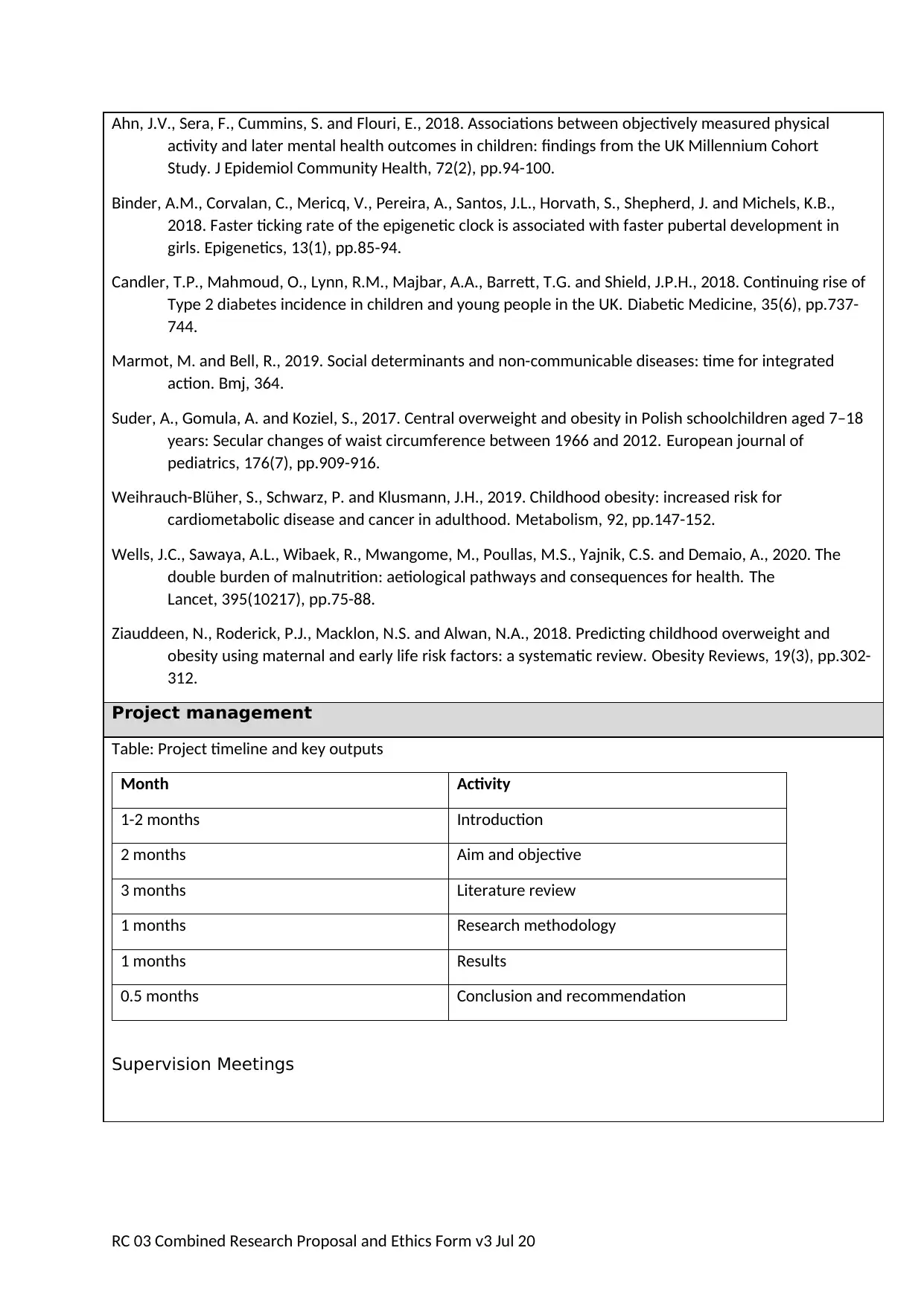
Ahn, J.V., Sera, F., Cummins, S. and Flouri, E., 2018. Associations between objectively measured physical
activity and later mental health outcomes in children: findings from the UK Millennium Cohort
Study. J Epidemiol Community Health, 72(2), pp.94-100.
Binder, A.M., Corvalan, C., Mericq, V., Pereira, A., Santos, J.L., Horvath, S., Shepherd, J. and Michels, K.B.,
2018. Faster ticking rate of the epigenetic clock is associated with faster pubertal development in
girls. Epigenetics, 13(1), pp.85-94.
Candler, T.P., Mahmoud, O., Lynn, R.M., Majbar, A.A., Barrett, T.G. and Shield, J.P.H., 2018. Continuing rise of
Type 2 diabetes incidence in children and young people in the UK. Diabetic Medicine, 35(6), pp.737-
744.
Marmot, M. and Bell, R., 2019. Social determinants and non-communicable diseases: time for integrated
action. Bmj, 364.
Suder, A., Gomula, A. and Koziel, S., 2017. Central overweight and obesity in Polish schoolchildren aged 7–18
years: Secular changes of waist circumference between 1966 and 2012. European journal of
pediatrics, 176(7), pp.909-916.
Weihrauch-Blüher, S., Schwarz, P. and Klusmann, J.H., 2019. Childhood obesity: increased risk for
cardiometabolic disease and cancer in adulthood. Metabolism, 92, pp.147-152.
Wells, J.C., Sawaya, A.L., Wibaek, R., Mwangome, M., Poullas, M.S., Yajnik, C.S. and Demaio, A., 2020. The
double burden of malnutrition: aetiological pathways and consequences for health. The
Lancet, 395(10217), pp.75-88.
Ziauddeen, N., Roderick, P.J., Macklon, N.S. and Alwan, N.A., 2018. Predicting childhood overweight and
obesity using maternal and early life risk factors: a systematic review. Obesity Reviews, 19(3), pp.302-
312.
Project management
Table: Project timeline and key outputs
Month Activity
1-2 months Introduction
2 months Aim and objective
3 months Literature review
1 months Research methodology
1 months Results
0.5 months Conclusion and recommendation
Supervision Meetings
RC 03 Combined Research Proposal and Ethics Form v3 Jul 20
activity and later mental health outcomes in children: findings from the UK Millennium Cohort
Study. J Epidemiol Community Health, 72(2), pp.94-100.
Binder, A.M., Corvalan, C., Mericq, V., Pereira, A., Santos, J.L., Horvath, S., Shepherd, J. and Michels, K.B.,
2018. Faster ticking rate of the epigenetic clock is associated with faster pubertal development in
girls. Epigenetics, 13(1), pp.85-94.
Candler, T.P., Mahmoud, O., Lynn, R.M., Majbar, A.A., Barrett, T.G. and Shield, J.P.H., 2018. Continuing rise of
Type 2 diabetes incidence in children and young people in the UK. Diabetic Medicine, 35(6), pp.737-
744.
Marmot, M. and Bell, R., 2019. Social determinants and non-communicable diseases: time for integrated
action. Bmj, 364.
Suder, A., Gomula, A. and Koziel, S., 2017. Central overweight and obesity in Polish schoolchildren aged 7–18
years: Secular changes of waist circumference between 1966 and 2012. European journal of
pediatrics, 176(7), pp.909-916.
Weihrauch-Blüher, S., Schwarz, P. and Klusmann, J.H., 2019. Childhood obesity: increased risk for
cardiometabolic disease and cancer in adulthood. Metabolism, 92, pp.147-152.
Wells, J.C., Sawaya, A.L., Wibaek, R., Mwangome, M., Poullas, M.S., Yajnik, C.S. and Demaio, A., 2020. The
double burden of malnutrition: aetiological pathways and consequences for health. The
Lancet, 395(10217), pp.75-88.
Ziauddeen, N., Roderick, P.J., Macklon, N.S. and Alwan, N.A., 2018. Predicting childhood overweight and
obesity using maternal and early life risk factors: a systematic review. Obesity Reviews, 19(3), pp.302-
312.
Project management
Table: Project timeline and key outputs
Month Activity
1-2 months Introduction
2 months Aim and objective
3 months Literature review
1 months Research methodology
1 months Results
0.5 months Conclusion and recommendation
Supervision Meetings
RC 03 Combined Research Proposal and Ethics Form v3 Jul 20
Paraphrase This Document
Need a fresh take? Get an instant paraphrase of this document with our AI Paraphraser
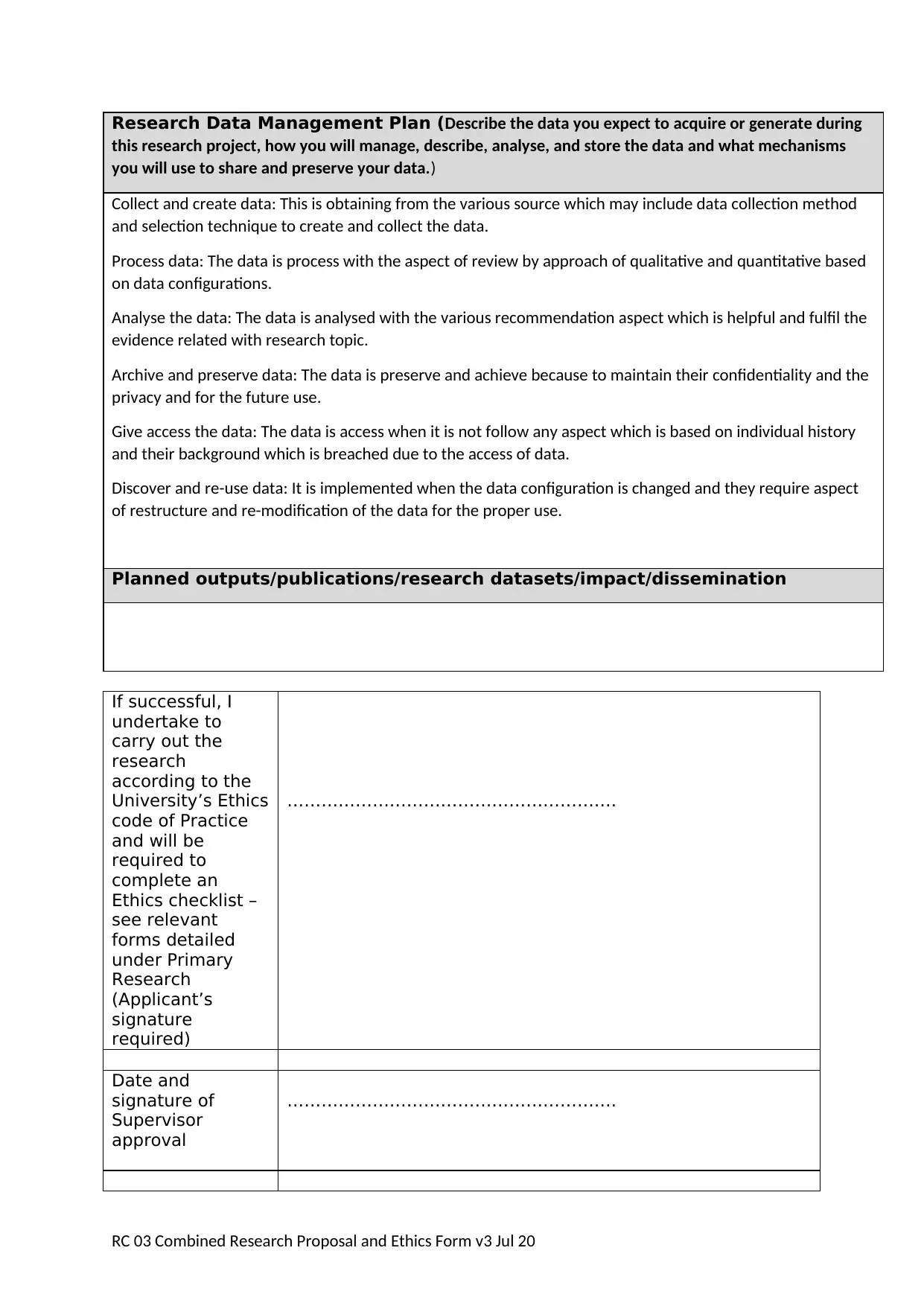
Research Data Management Plan (Describe the data you expect to acquire or generate during
this research project, how you will manage, describe, analyse, and store the data and what mechanisms
you will use to share and preserve your data.)
Collect and create data: This is obtaining from the various source which may include data collection method
and selection technique to create and collect the data.
Process data: The data is process with the aspect of review by approach of qualitative and quantitative based
on data configurations.
Analyse the data: The data is analysed with the various recommendation aspect which is helpful and fulfil the
evidence related with research topic.
Archive and preserve data: The data is preserve and achieve because to maintain their confidentiality and the
privacy and for the future use.
Give access the data: The data is access when it is not follow any aspect which is based on individual history
and their background which is breached due to the access of data.
Discover and re-use data: It is implemented when the data configuration is changed and they require aspect
of restructure and re-modification of the data for the proper use.
Planned outputs/publications/research datasets/impact/dissemination
If successful, I
undertake to
carry out the
research
according to the
University’s Ethics
code of Practice
and will be
required to
complete an
Ethics checklist –
see relevant
forms detailed
under Primary
Research
(Applicant’s
signature
required)
………………………………………………….
Date and
signature of
Supervisor
approval
………………………………………………….
RC 03 Combined Research Proposal and Ethics Form v3 Jul 20
this research project, how you will manage, describe, analyse, and store the data and what mechanisms
you will use to share and preserve your data.)
Collect and create data: This is obtaining from the various source which may include data collection method
and selection technique to create and collect the data.
Process data: The data is process with the aspect of review by approach of qualitative and quantitative based
on data configurations.
Analyse the data: The data is analysed with the various recommendation aspect which is helpful and fulfil the
evidence related with research topic.
Archive and preserve data: The data is preserve and achieve because to maintain their confidentiality and the
privacy and for the future use.
Give access the data: The data is access when it is not follow any aspect which is based on individual history
and their background which is breached due to the access of data.
Discover and re-use data: It is implemented when the data configuration is changed and they require aspect
of restructure and re-modification of the data for the proper use.
Planned outputs/publications/research datasets/impact/dissemination
If successful, I
undertake to
carry out the
research
according to the
University’s Ethics
code of Practice
and will be
required to
complete an
Ethics checklist –
see relevant
forms detailed
under Primary
Research
(Applicant’s
signature
required)
………………………………………………….
Date and
signature of
Supervisor
approval
………………………………………………….
RC 03 Combined Research Proposal and Ethics Form v3 Jul 20
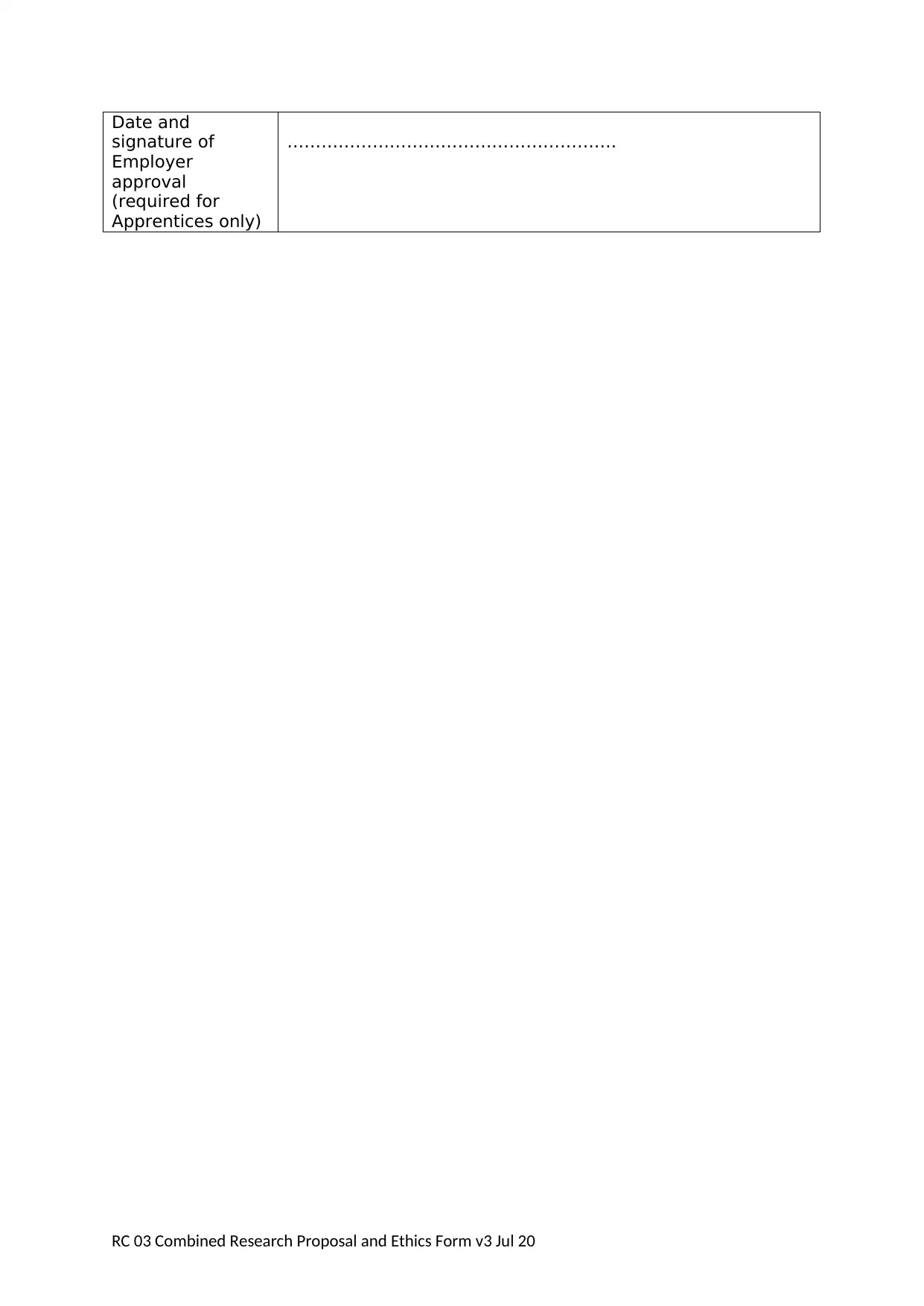
Date and
signature of
Employer
approval
(required for
Apprentices only)
………………………………………………….
RC 03 Combined Research Proposal and Ethics Form v3 Jul 20
signature of
Employer
approval
(required for
Apprentices only)
………………………………………………….
RC 03 Combined Research Proposal and Ethics Form v3 Jul 20
⊘ This is a preview!⊘
Do you want full access?
Subscribe today to unlock all pages.

Trusted by 1+ million students worldwide
1 out of 6
Related Documents
Your All-in-One AI-Powered Toolkit for Academic Success.
+13062052269
info@desklib.com
Available 24*7 on WhatsApp / Email
![[object Object]](/_next/static/media/star-bottom.7253800d.svg)
Unlock your academic potential
Copyright © 2020–2026 A2Z Services. All Rights Reserved. Developed and managed by ZUCOL.



